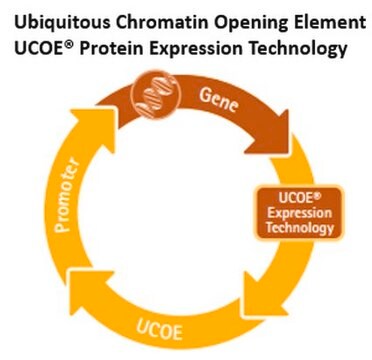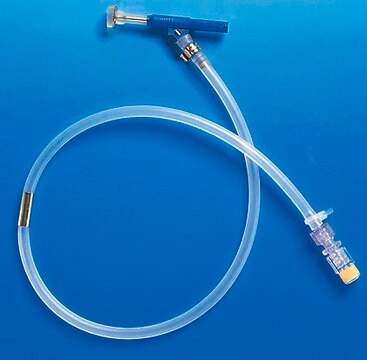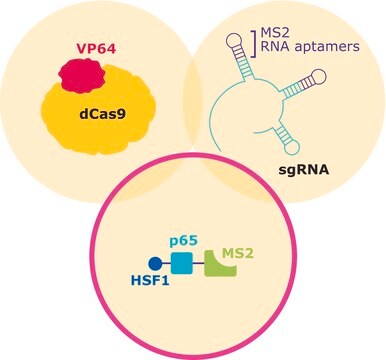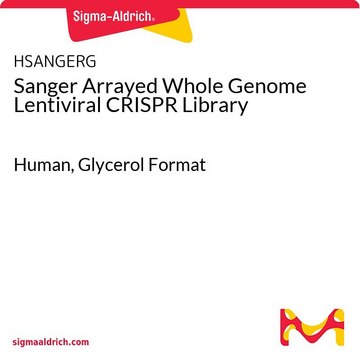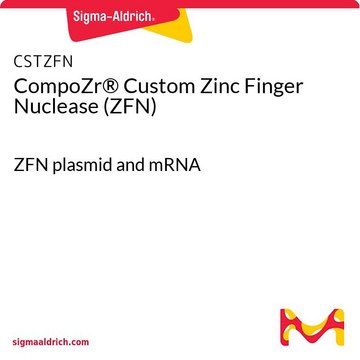CTI1
CompoZr® Targeted Integration Kit - AAVS1
Transgene Integration in the Human Genome
Autenticatiper visualizzare i prezzi riservati alla tua organizzazione & contrattuali
About This Item
Codice UNSPSC:
12352200
NACRES:
NA.51
Prodotti consigliati
Descrizione generale
The CompoZr Targeted Integration Kit – AAVS1 is designed to rapidly integrate a user-specified gene of interest (GOI) into the adeno-associated virus integration site 1 (AAVS1) on human chromosome 19. The Zinc Finger Nuclease (ZFN) in this kit targets the AAVS1 site with high specificity, creating a double strand break. The cell then uses the pZDonor plasmid, with homology arms to the AAVS1 genomic region, in homology-directed repair to replace the natural AAVS1 locus. The pZDonor plasmid can be engineered to contain your GOI and will direct targeted integration of your GOI into the AAVS1 locus.
Caratteristiche e vantaggi
•Effective integration efficiency without antibiotic selection
The ZFNs engineered to target AAVS1 are a well-validated pair that cut the DNA with high efficiency. ZFN-aided targeted integration can achieve 20% efficiency in some cell types without antibiotic selection, representing an improvement of three to four orders of magnitude in efficiency over normal homologous recombination events1.
•Rapid biallelic insertions through a single transfection
ZFN mediated homology-directed repair leads to gene addition within 48 hours of transfection of ZFN mRNA/plasmid donor, with both monoallelic and biallelic insertions1.
•Controlled transgene effects through use of single genomic locus
In the past, most transgenic cell lines have been constructed via random integration of a plasmid. This results in a collection of clones with greatly varied expression levels and expression stability. Targeted integration into the AAVS1 locus will provide a common integration site with stable, uniform expression levels1.
• Eliminates need to engineer cell lines with transgene landing pads
Transgene integration into the genome has previously been achieved via recombination through recombinases such as Cre and FLP. This requires prior insertion of a transgene landing pad into the genome through random integration followed by transgene addition, making it a lengthy two step process. Targeted integration into AAVS1 eliminates the first step, making transgene expression a simple 1-step process1.
The ZFNs engineered to target AAVS1 are a well-validated pair that cut the DNA with high efficiency. ZFN-aided targeted integration can achieve 20% efficiency in some cell types without antibiotic selection, representing an improvement of three to four orders of magnitude in efficiency over normal homologous recombination events1.
•Rapid biallelic insertions through a single transfection
ZFN mediated homology-directed repair leads to gene addition within 48 hours of transfection of ZFN mRNA/plasmid donor, with both monoallelic and biallelic insertions1.
•Controlled transgene effects through use of single genomic locus
In the past, most transgenic cell lines have been constructed via random integration of a plasmid. This results in a collection of clones with greatly varied expression levels and expression stability. Targeted integration into the AAVS1 locus will provide a common integration site with stable, uniform expression levels1.
• Eliminates need to engineer cell lines with transgene landing pads
Transgene integration into the genome has previously been achieved via recombination through recombinases such as Cre and FLP. This requires prior insertion of a transgene landing pad into the genome through random integration followed by transgene addition, making it a lengthy two step process. Targeted integration into AAVS1 eliminates the first step, making transgene expression a simple 1-step process1.
Note legali
All Zinc Finger Nucleases are sold under license from Sangamo Biosciences. For a copy of the Label License provided with purchase of CompoZr ZFNs, please visit the ZFN Label License page.
CompoZr is a registered trademark of Merck KGaA, Darmstadt, Germany
Codice della classe di stoccaggio
10 - Combustible liquids
Punto d’infiammabilità (°F)
Not applicable
Punto d’infiammabilità (°C)
Not applicable
Scegli una delle versioni più recenti:
Possiedi già questo prodotto?
I documenti relativi ai prodotti acquistati recentemente sono disponibili nell’Archivio dei documenti.
Il team dei nostri ricercatori vanta grande esperienza in tutte le aree della ricerca quali Life Science, scienza dei materiali, sintesi chimica, cromatografia, discipline analitiche, ecc..
Contatta l'Assistenza Tecnica.
